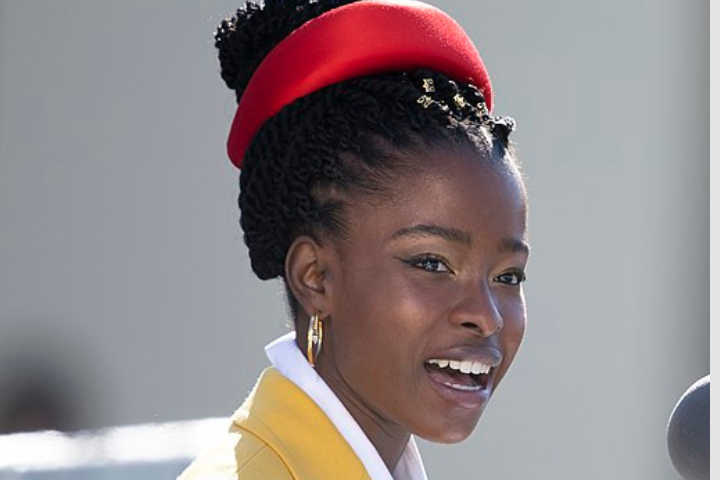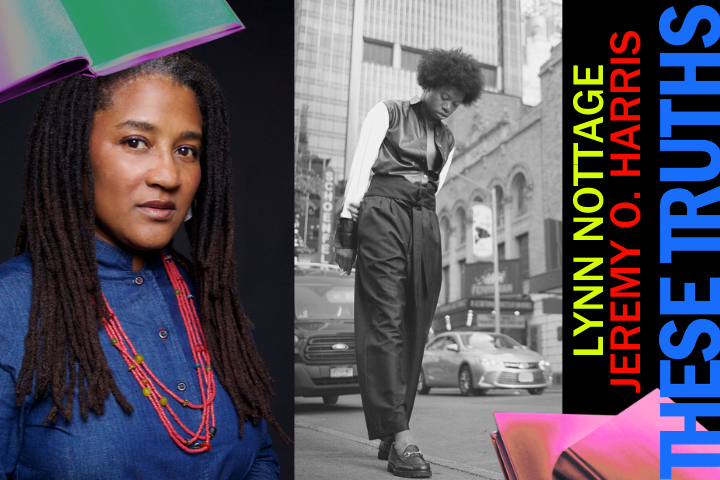
PEN America kicked off its 20th World Voices Festival on the 100th day of the Trump administration with a lively – and timely – opening night discussion between Chimamanda Ngozi Adichie, Jennifer Egan, and Burhan Sönmez centered on the role of novelists in times of crisis.
The Opening Night event, The PEN and the State, moderated by PEN America Interim Co-CEO Clarisse Rosaz Shariyf, highlighted attacks on free expression and the role of language and literature in resisting authoritarianism. In a wide-ranging conversation, Adichie (Dream Count), Egan (The Candy House), and Sönmez (Lovers of Franz K.) spoke about their dismay at the current political landscape – and the hope that writing gives them.
On the arrests of international students
The panelists reacted to the arrest of Tufts graduate student Rümeysa Öztürk, who was snatched from the street, imprisoned and threatened with deportation, reportedly for a pro-Palestinian op-ed in the Tufts University student newspaper.
Jenifer Egan: “I just can’t believe that happened here. It looked like the kind of video that one would see of something happening in another country where those kinds of things can happen. And it was especially weird because having been president of PEN America during the first Trump administration, even then, this would have been unimaginable. It felt like it was unimaginable, until the moment I saw it.”
Chimamanda Ngozi Adichie: “Honestly, when I first saw the video, my first thought was that it was AI-generated, and I suppose it says something about how often now my first instinct is disbelief. … On a very personal level, I felt enraged on her behalf, that you have men masked approaching you and taking you away. There’s a loss of dignity and humiliation there that enraged me. I think a lot of what’s happening links to identity. If this woman were from different parts of the world, would she have been treated this way? And I think not.”
Burhan Sönmez: “In Türkiye in the mid-20th century, there was a slogan created by politicians: Make Turkey Little America. … But now we see that America is becoming a bigger Türkiye.”

On the banning of words by federal agencies
Banning words, to the panelists, felt less terrifying and more “stupid.”
Adichie: “I think this is just ineptitude. It just gets really alarmingly stupid. And I just don’t get the point. Sometimes with authoritarians, you kind of see the warped vision. With this, I’m just thinking, ‘Why?’ … I don’t think that authoritarianism can destroy the human imagination. I don’t think it can destroy storytelling. I don’t think it can destroy words.”
“I don’t think that authoritarianism can destroy the human imagination. I don’t think it can destroy storytelling. I don’t think it can destroy words.”
Chimamanda Ngozi Adichie
Egan: “People are just a little too smart for that. … I mean, it’s such a blunt and a stupid instrument.”
Sönmez: “In my country, my language (Kurdish) has been banned for 100 years. … And so it is a long struggle for us. … But in language, in literature, we know that there is not good or bad language; there’s good or bad books in any language you love.”
On the role of writers in hard times
Do the writers feel a responsibility to convey or educate about the times? Only if it’s part of a good story.
Egan: “This is going to sound superficial, but I just want it to be fun. I see it as entertainment. I read for fun, for escape. … But I also think any creator is absorbing and synthesizing and sort of crystallizing the context that they’re in, whether they do it consciously or not. It’s a sort of collective dreaming process. … But really, on the surface, I just try to write a good story. And I find that generally, if I am able to do that, at least to my satisfaction, a lot of the ideas that I’ve been thinking about find their way in, and so it doesn’t feel so burdensome.”
Adichie: “I don’t think a writer has a responsibility to engage with politics. I think our only responsibility is to write or not to write. But I do think that a writer who chooses to engage with politics really has to do it well, by which I mean, it can’t be the same thing as what we’ll be reading in the news. It has to bring more. It still has to be literature.”
Sönmez: “Politics is like poison, poison in the air as soon as we step out of our house and when we breathe in. When we are at home, we say that ‘I don’t want to breathe that air. I just want to focus on writing books, my family, and talking to my friends on the phone.’ There are beautiful things in this world, but unfortunately, this is the world that is not created by us, but the place that we found ourselves in. … Everything is happening now in front of our eyes. How can I write something without thinking of Victoria (Amelina) or Refaat (Alareer)? It’s too much. This is a big burden, but of another thing, we should be confident. We can be responsible to humanity as writers. We will write beautiful things. We will leave beautiful things for the future generations.”
On becoming a writer

Sönmez: “Every novelist is a failed poet. It’s a saying. I don’t believe that, but it’s true for me. … My dream was to make our country a democratic place for everyone, and also to be known as a good poet, but I was wounded very badly. … I lost my ability to read for about two years, and during that time, I started to write some notes. … I thought to myself, oh, maybe I can start writing a novel.”
Adichie: “I really think of my writing as something that my ancestors gave me, a blessing. In some ways, it’s a blessing, and then you make the choice whether or not to use it, and I made the choice to use it. I don’t remember a time when I was not interested in writing stories and in reading, but actually writing came first. … I think of it as a vocation. I don’t think of it as a career. … I find it very moving that you can write something that means a lot to you, and somehow you form a connection with another human being. I just think it’s the most glorious thing.
Egan: “I didn’t really want to be a writer growing up. … But when I was 18, I took a gap year, and I went to Europe with a backpack, and I started having panic attacks. … In the midst of that, I realized that the thing that sort of completed any experience was always writing, whether it was something great or whether it was something terrifying. Writing made it complete and that’s why ‘vocation’ really is the right word, because it felt like my life had meaning when I wrote that it wouldn’t have had otherwise. So it feels kind of like a spiritual practice for me, and I’m so glad that it found me.”
“It felt like my life had meaning when I wrote that it wouldn’t have had otherwise. So it feels kind of like a spiritual practice for me, and I’m so glad that it found me.”
Jennifer Egan
On supporting literary culture and resistance
Egan: “One thing I think about is the importance of keeping literary culture strong, which is PEN America’s mission, which is what will empower all of us to do the most that we can. And I think about the fact that some of the smartest people in the world are devoting their careers to figuring out how to keep us from reading deeply, how to keep us scrolling and not reading – and that’s a fact, that’s not paranoid fantasy. And so I feel such an allegiance to anyone who cares about literature. Anyone who cares about reading deeply, I consider an ally. And I think if there was ever a time to think about what holds us together as writers, instead of whatever differences we might have, I think this is really the time, because the stronger we are as a group, the more power all of us have as individuals and as a group.”
Adichie: “I think observing what’s happening in this country made me even more certain of certain things, one of which is, I will never give in to despair. I will never give in to self censorship, and I will always be willing to face the consequences of saying what I want to say. But at the same time, I think it’s important for us to be doing a little bit of self reflection and acknowledge that the idea of thinking about what to say, how to say, self censorship, didn’t start at this moment. And also, it’s not a thing that only exists on the political right. And the reason I think it’s important is that sometimes it’s easy to become smart and point fingers and not acknowledge that there are many writers for whom the struggle – What do I say? How do I say it? Do I censor myself? Do I tell the story I want to tell? – that there are many writers for whom that did not start 100 days ago. And so if there is maybe any way to be hopeful about this moment, it is to perhaps think about using this and the horrors of this political administration as a way of rethinking the authoritarianism on the left, because it exists. And often it’s cultural. And I think that there’s something about the fiction in particular that’s being produced in America, to me that just feels safe. And I don’t think the job of fiction is to be safe.”
Egan: “Have a conversation, rather than walking away, canceling, boycotting, or, in effect, silencing, which is what all of that is, because those really are the tools of the right. … As writers, we are our voices. That is our livelihood. We have to be able to talk to each other and set an example.”
Want more?
Check out the panelists’ books:
- Lovers of Franz K. by Burhan Sönmez
- Dream Count by Chimamanda Ngozi Adichie
- The Candy House by Jennifer Egan











